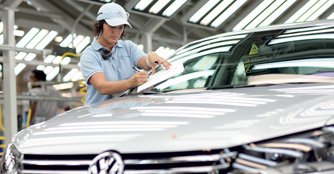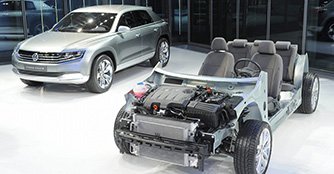Modular platforms - Cheaper, Better, Faster
29 Aug 2013|12,215 views
Since Henry Ford's success with the world's first mass manufactured car, carmakers globally have been investing in R&D to make cars better, cheaper to produce and faster to market. Modern carmakers have thus introduced modular platforms that can be shared amongst their automobiles. The word 'modular' here is important because it means that the platform can be shrunk and stretched depending on the car.
Let's take a look at the Volkswagen (VW) Group and their MQB (Modularer Querbaukasten - German for Modular Transverse Matrix) platform. The MQB platform's range stretches from subcompacts to mid-sized family cars and is seen on the third generation Audi A3 Sportback, Seat Leon and Skoda Octavia, as well as the Volkswagen Golf Mk7.
VW Group is touting this platform as a massive cost-cutter, which will allow them to produce their cars at a lower price, and share as many mechanical bits as possible. The move to a single platform system will allow the VW Group to gain huge savings in a production cycle due to economies of scale and these savings allow greater use of high-strength materials, making the cars safer and better built.
Standardisation also reduces the cost of manufacturing components and provides ease of sourcing, which is better for the production team. Reduction in cost of procurement means that features and equipment of premium cars can be provided in budget cars and in turn, end users can reap these benefits.
And by creating a standardised, interchangeable set of parts from which to build a variety of cars, the time taken to build a car will be reduced, resulting in faster production and delivery.

Other carmakers have thus followed suit such as the PSA/Peugeot-Citroen Group with their Efficient Modular Platform (EMP2) Platform, Toyota with their Toyota New Global Architecture (TGNA), as well as BMW and MINI who will share a new front-wheel platform that will underpin up to 12 cars, starting with the replacement for the MINI hatchback due next year.
As we all know, competition in today's global economy is intense as consumer whims shift with each technological development. VW Group's MQB platform seems to set its rivals thinking of new strategies to be Cheaper, Better, Faster, which, by the way, means investing more in people and technology to stay ahead of competition. And for the drivers in us, our demands for a better ride drive innovation in the industry.
Since Henry Ford's success with the world's first mass manufactured car, carmakers globally have been investing in R&D to make cars better, cheaper to produce and faster to market. Modern carmakers have thus introduced modular platforms that can be shared amongst their automobiles. The word 'modular' here is important because it means that the platform can be shrunk and stretched depending on the car.
Let's take a look at the Volkswagen (VW) Group and their MQB (Modularer Querbaukasten - German for Modular Transverse Matrix) platform. The MQB platform's range stretches from subcompacts to mid-sized family cars and is seen on the third generation Audi A3 Sportback, Seat Leon and Skoda Octavia, as well as the Volkswagen Golf Mk7.
VW Group is touting this platform as a massive cost-cutter, which will allow them to produce their cars at a lower price, and share as many mechanical bits as possible. The move to a single platform system will allow the VW Group to gain huge savings in a production cycle due to economies of scale and these savings allow greater use of high-strength materials, making the cars safer and better built.
Standardisation also reduces the cost of manufacturing components and provides ease of sourcing, which is better for the production team. Reduction in cost of procurement means that features and equipment of premium cars can be provided in budget cars and in turn, end users can reap these benefits.
And by creating a standardised, interchangeable set of parts from which to build a variety of cars, the time taken to build a car will be reduced, resulting in faster production and delivery.

Other carmakers have thus followed suit such as the PSA/Peugeot-Citroen Group with their Efficient Modular Platform (EMP2) Platform, Toyota with their Toyota New Global Architecture (TGNA), as well as BMW and MINI who will share a new front-wheel platform that will underpin up to 12 cars, starting with the replacement for the MINI hatchback due next year.
As we all know, competition in today's global economy is intense as consumer whims shift with each technological development. VW Group's MQB platform seems to set its rivals thinking of new strategies to be Cheaper, Better, Faster, which, by the way, means investing more in people and technology to stay ahead of competition. And for the drivers in us, our demands for a better ride drive innovation in the industry.
Thank You For Your Subscription.






















